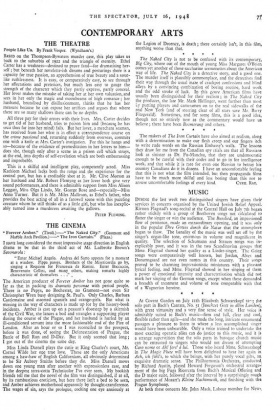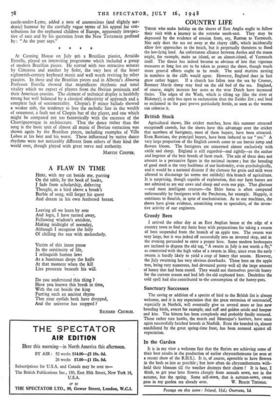MUSIC
DURING the last week two distinguished singers have given theit services in concerts organised by the United Jewish Relief Appeal. Kirsten Flagstad's song-recital at the Central Hall on July 7th began rather stickily with a group of Beethoven songs not calculated to flatter the singer or win the audience. The Busslied, an impassioned flow of penitence, made an extraordinary opening, and it was only in the popular Ehre Gottes durch die Natur that the atmosphere began to thaw. The banality of the music was well set off by the singer's organ-like tone, enormous in volume and magnificent in quality. The selection of Schumann and Strauss songs was in- explicably poor, and it was in the two Scandinavian groups that Mme. Flagstad showed her quality as a Lieder-singer. The Grieg songs were comparatively well known, but Jordan, Alves and Dorumsgaard are not even names in this country. Their songs proved to be charming impressionistic miniatures with a pleasant lyrical feeling, and Mme. Flagstad showed in her singing of them a power of emotional intensity and characterisation which did not mark her singing of the German songs, except when these demanded a breadth of treatment and volume of tone comparable with that of a Wagnerian heroine.
* * * *
At Covent Garden on July irth Elizabeth Schwarzkopf sar.3 the solo part in Bach's Cantata, No. 51 (Jauchzet Gott in alien Landen), with great virtuosity and a very fine sense of style. Her voice is admirably suited to Bach's music—firm and full, clear and cool, flexible rather than agile—and she made the long, intricate ornamental passages a pleasure to listen to where a less accomplished singer would have been unbearable. Only a voice trained to undertake the most exacting operatic roles can do justice to this music, and it is a strange superstition that the solo parts in baroque church music can be entrusted to singers who would not dream of attempting Caro nome or Ah! fore h lui. Those who heard Mme. Schwarzkopf in The Magic Flute will have been delighted to hear her again m Ach, ich flail's, to which she brings, with her purely vocal gifts, an exquisite dramatic sense. The Philharmonia Orchestra, conducted, by Richard Austin, played Howard Ferguson's orchestral arrange- ment of the big Fuga Ricercata from Bach's Musical Offering and the D major suite, followed after the interval by a surprisingly rough performance of Mozart's Kleine Nachtmusik, and finishing with the Prague Symphony.
At both these concerts Mr. John Mack, Labour member for New-) castle-under-Lyme, added a note of unconscious (and slightly sar- donic) humour by the carefully vague terms of his appeal for con- tributions for the orphaned children of Europe, apparently irrespec- tive of race and by his quotation from the New Testament prefixed by: "As the poet says."
At Canning House on July 9th a Brazilian pianist, Arnaldo Estrella, played an interesting programme which included a group of modern Brazilian pieces. He started with two attractive sonatas by Cimarosa and another by Soler, the very best of the lesser eighteenth-century keyboard music and well worth reviving by other pianists. In these and the Brazilian pieces and in Albeniz's Almeria Professor Estrella showed that magnificent rhythmic and tonal vitality which we expect of players from the Iberian peninsula and their American cousins. The element of technical display is healthily strong but well balanced by a classical objectivity of approach and a complete lack of sentimentality. Chopin's F minor ballade showed a weaker side, the tendency to lose the melodic line in the wealth of ornament, a fault not of Chopin but of the player, and one which might be compared not too fantastically with the excesses of the Churrigueresque in architecture. That the dance rather than the song is the basic unit of almost all music of Iberian extraction was shown again by the Brazilian pieces, including examples of Villa Lobos at his best and his worst. Those influenced by native dance rhythms were not noticeably different from others of their kind the world over, though played with great verve and authority.
MARTIN COOPER.



































 Previous page
Previous page